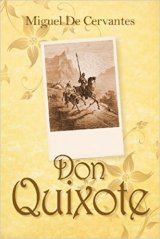Don Quixote Page #2
The Ingenious Nobleman Sir Quixote of La Mancha, or just Don Quixote, is a Spanish novel by Miguel de Cervantes.
He next proceeded to inspect his hack, which, with more quartos than a real and more blemishes than the steed of Gonela, that "tantum pellis et ossa fuit," surpassed in his eyes the Bucephalus of Alexander or the Babieca of the Cid. Four days were spent in thinking what name to give him, because (as he said to himself) it was not right that a horse belonging to a knight so famous, and one with such merits of his own, should be without some distinctive name, and he strove to adapt it so as to indicate what he had been before belonging to a knight-errant, and what he then was; for it was only reasonable that, his master taking a new character, he should take a new name, and that it should be a distinguished and full-sounding one, befitting the new order and calling he was about to follow. And so, after having composed, struck out, rejected, added to, unmade, and remade a multitude of names out of his memory and fancy, he decided upon calling him Rocinante, a name, to his thinking, lofty, sonorous, and significant of his condition as a hack before he became what he now was, the first and foremost of all the hacks in the world. Having got a name for his horse so much to his taste, he was anxious to get one for himself, and he was eight days more pondering over this point, till at last he made up his mind to call himself "Don Quixote," whence, as has been already said, the authors of this veracious history have inferred that his name must have been beyond a doubt Quixada, and not Quesada as others would have it. Recollecting, however, that the valiant Amadis was not content to call himself curtly Amadis and nothing more, but added the name of his kingdom and country to make it famous, and called himself Amadis of Gaul, he, like a good knight, resolved to add on the name of his, and to style himself Don Quixote of La Mancha, whereby, he considered, he described accurately his origin and country, and did honour to it in taking his surname from it. So then, his armour being furbished, his morion turned into a helmet, his hack christened, and he himself confirmed, he came to the conclusion that nothing more was needed now but to look out for a lady to be in love with; for a knight-errant without love was like a tree without leaves or fruit, or a body without a soul. As he said to himself, "If, for my sins, or by my good fortune, I come across some giant hereabouts, a common occurrence with knights-errant, and overthrow him in one onslaught, or cleave him asunder to the waist, or, in short, vanquish and subdue him, will it not be well to have some one I may send him to as a present, that he may come in and fall on his knees before my sweet lady, and in a humble, submissive voice say, 'I am the giant Caraculiambro, lord of the island of Malindrania, vanquished in single combat by the never sufficiently extolled knight Don Quixote of La Mancha, who has commanded me to present myself before your Grace, that your Highness dispose of me at your pleasure'?" Oh, how our good gentleman enjoyed the delivery of this speech, especially when he had thought of some one to call his Lady! There was, so the story goes, in a village near his own a very good-looking farm-girl with whom he had been at one time in love, though, so far as is known, she never knew it nor gave a thought to the matter. Her name was Aldonza Lorenzo, and upon her he thought fit to confer the title of Lady of his Thoughts; and after some search for a name which should not be out of harmony with her own, and should suggest and indicate that of a princess and great lady, he decided upon calling her Dulcinea del Toboso--she being of El Toboso--a name, to his mind, musical, uncommon, and significant, like all those he had already bestowed upon himself and the things belonging to him. CHAPTER II. WHICH TREATS OF THE FIRST SALLY THE INGENIOUS DON QUIXOTE MADE FROM HOME These preliminaries settled, he did not care to put off any longer the execution of his design, urged on to it by the thought of all the world was losing by his delay, seeing what wrongs he intended to right, grievances to redress, injustices to repair, abuses to remove, and duties to discharge. So, without giving notice of his intention to anyone, and without anybody seeing him, one morning before the dawning of the day (which was one of the hottest of the month of July) he donned his suit of armour, mounted Rocinante with his patched-up helmet on, braced his buckler, took his lance, and by the back door of the yard sallied forth upon the plain in the highest contentment and satisfaction at seeing with what ease he had made a beginning with his grand purpose. But scarcely did he find himself upon the open plain, when a terrible thought struck him, one all but enough to make him abandon the enterprise at the very outset. It occurred to him that he had not been dubbed a knight, and that according to the law of chivalry he neither could nor ought to bear arms against any knight; and that even if he had been, still he ought, as a novice knight, to wear white armour, without a device upon the shield until by his prowess he had earned one. These reflections made him waver in his purpose, but his craze being stronger than any reasoning, he made up his mind to have himself dubbed a knight by the first one he came across, following the example of others in the same case, as he had read in the books that brought him to this pass. As for white armour, he resolved, on the first opportunity, to scour his until it was whiter than an ermine; and so comforting himself he pursued his way, taking that which his horse chose, for in this he believed lay the essence of adventures. Thus setting out, our new-fledged adventurer paced along, talking to himself and saying, "Who knows but that in time to come, when the veracious history of my famous deeds is made known, the sage who writes it, when he has to set forth my first sally in the early morning, will do it after this fashion? 'Scarce had the rubicund Apollo spread o'er the face of the broad spacious earth the golden threads of his bright hair, scarce had the little birds of painted plumage attuned their notes to hail with dulcet and mellifluous harmony the coming of the rosy Dawn, that, deserting the soft couch of her jealous spouse, was appearing to mortals at the gates and balconies of the Manchegan horizon, when the renowned knight Don Quixote of La Mancha, quitting the lazy down, mounted his celebrated steed Rocinante and began to traverse the ancient and famous Campo de Montiel;'" which in fact he was actually traversing. "Happy the age, happy the time," he continued, "in which shall be made known my deeds of fame, worthy to be moulded in brass, carved in marble, limned in pictures, for a memorial for ever. And thou, O sage magician, whoever thou art, to whom it shall fall to be the chronicler of this wondrous history, forget not, I entreat thee, my good Rocinante, the constant companion of my ways and wanderings." Presently he broke out again, as if he were love-stricken in earnest, "O Princess Dulcinea, lady of this captive heart, a grievous wrong hast thou done me to drive me forth with scorn, and with inexorable obduracy banish me from the presence of thy beauty. O lady, deign to hold in remembrance this heart, thy vassal, that thus in anguish pines for love of thee."
Translation
Translate and read this book in other languages:
Select another language:
- - Select -
- 简体中文 (Chinese - Simplified)
- 繁體中文 (Chinese - Traditional)
- Español (Spanish)
- Esperanto (Esperanto)
- 日本語 (Japanese)
- Português (Portuguese)
- Deutsch (German)
- العربية (Arabic)
- Français (French)
- Русский (Russian)
- ಕನ್ನಡ (Kannada)
- 한국어 (Korean)
- עברית (Hebrew)
- Gaeilge (Irish)
- Українська (Ukrainian)
- اردو (Urdu)
- Magyar (Hungarian)
- मानक हिन्दी (Hindi)
- Indonesia (Indonesian)
- Italiano (Italian)
- தமிழ் (Tamil)
- Türkçe (Turkish)
- తెలుగు (Telugu)
- ภาษาไทย (Thai)
- Tiếng Việt (Vietnamese)
- Čeština (Czech)
- Polski (Polish)
- Bahasa Indonesia (Indonesian)
- Românește (Romanian)
- Nederlands (Dutch)
- Ελληνικά (Greek)
- Latinum (Latin)
- Svenska (Swedish)
- Dansk (Danish)
- Suomi (Finnish)
- فارسی (Persian)
- ייִדיש (Yiddish)
- հայերեն (Armenian)
- Norsk (Norwegian)
- English (English)
Citation
Use the citation below to add this book to your bibliography:
Style:MLAChicagoAPA
"Don Quixote Books." Literature.com. STANDS4 LLC, 2025. Web. 4 Feb. 2025. <https://www.literature.com/book/don_quixote_27>.








Discuss this Don Quixote book with the community:
Report Comment
We're doing our best to make sure our content is useful, accurate and safe.
If by any chance you spot an inappropriate comment while navigating through our website please use this form to let us know, and we'll take care of it shortly.
Attachment
You need to be logged in to favorite.
Log In